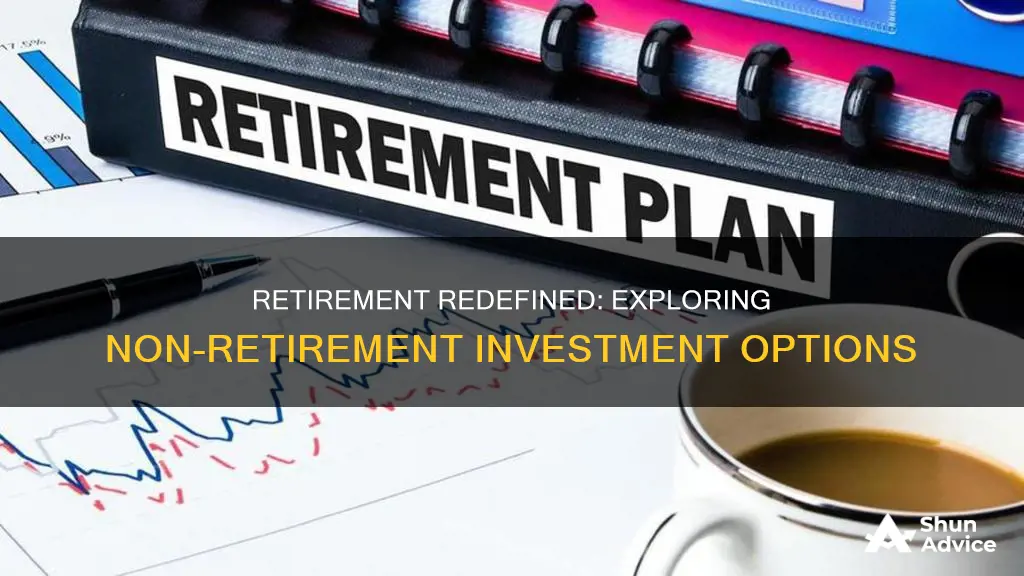
Non-retirement investment options are investment accounts outside of retirement plans. These options are for those who have already maxed out their 401(k) or IRA accounts and are looking for other ways to grow their wealth. Non-retirement investments are more flexible than retirement investments, as they can be accessed at any time and can be used for multiple goals, such as saving for retirement or maximising the growth of dollars for use in the near future.
| Characteristics | Values |
|---|---|
| Type | Brokerage account, Education accounts (e.g. 529 plan), Health Savings Accounts (HSAs), Real estate, Small business, Taxable investment accounts, Tax-deferred annuities |
| Control | Non-qualified investments allow for more control over the investment |
| Tax treatment | Non-qualified investments are funded with after-tax dollars |
| Contribution limits | Non-qualified investments have no limits on how much money can be contributed each year |
| Access | Non-retirement investments can be accessed at any time |
| Purpose | Non-retirement investments can be used to grow wealth for retirement or to maximise the growth of dollars for use in the near future |
What You'll Learn

Brokerage Accounts
There are several benefits to brokerage accounts. Firstly, they offer flexibility in terms of investment options and allow you to choose your own investments. Secondly, they provide tax diversification, as you can be more strategic about when and how you access your money. While retirement accounts have rules and penalties for early withdrawals, with non-qualified accounts, you can withdraw money at any time, although earnings are typically subject to capital gains tax. Finally, there are no limits on how much money you can contribute to a brokerage account annually.
There are a few considerations to keep in mind when choosing a brokerage account. These accounts are taxable, as they are funded with after-tax money. You will pay taxes on income earned from yearly dividends or interest, as well as capital gains when you sell stocks. Additionally, brokerage accounts have variable fees related to the amount of engagement required to open and maintain them, so it's important to consider these costs.
When deciding whether to open a brokerage account, it's recommended to ask yourself a few questions. These include:
- Do I have sufficient emergency funds set aside in a savings account?
- Am I taking full advantage of company matches in my retirement account?
- Have I invested enough in my retirement accounts to meet my post-retirement goals?
- Do I want to fund a 529 plan for education expenses?
- Do I have access to and the ability to fund a Health Savings Account (HSA)?
Invest Now: Where to Put Your Money
You may want to see also

Education plans
There are two types of 529 plans: prepaid tuition plans and education savings plans. Prepaid tuition plans allow you to purchase units or credits at participating colleges and universities, usually public and in-state, for future tuition and mandatory fees at current prices. On the other hand, education savings plans allow you to open an investment account to save for future qualified higher education expenses, including tuition, mandatory fees, and room and board. Withdrawals from education savings plans can generally be used at any college or university, and sometimes even at non-US colleges and universities.
It is important to note that if the money in a 529 plan is used for non-education expenses, it may be subject to income tax and a penalty. Additionally, there are fees and expenses associated with 529 plans that can lower your returns, so it is crucial to carefully review the plan's offering circular to understand all the fees charged.
When considering a 529 plan, it is also essential to think about how it might impact financial aid eligibility. While each educational institution may treat assets held in a 529 account differently, investing in a 529 plan can generally impact a student's eligibility to receive need-based financial aid.
Overall, education plans like the 529 plan offer a great opportunity to save for future education costs, but it is important to carefully consider the restrictions, fees, and potential impact on financial aid before investing.
Planning for Retirement: Navigating the Investment Scale-Back
You may want to see also

Real estate
There are several ways to invest in real estate:
- Rental properties: Choosing locations with high rental demand and hiring a property management company can help maximise returns.
- Real estate investment trusts (REITs): REITs are publicly traded companies that invest in a diversified portfolio of income-producing properties. They are an attractive option for passive real estate investment, as they distribute a significant portion of their income as dividends.
- Real estate crowdfunding: Online platforms allow individuals to invest in real estate projects with other investors, providing portfolio diversification without the responsibility of property management.
- Fix-and-flip properties: Buying distressed properties, renovating them, and selling them for a profit can be lucrative but also involves significant risks.
- Short-term rentals: Platforms like Airbnb or VRBO can provide higher rental income than traditional long-term leases but may require more active management and compliance with local regulations.
- Real estate partnerships: Joining forces with others to invest in real estate can reduce the financial burden and risk. Limited partnerships or joint ventures allow for the combination of resources and expertise.
- Real estate notes: Investing in real estate notes, or mortgage notes, is a passive way to earn interest income by becoming the lender and receiving regular payments from borrowers.
- Real estate exchange-traded funds (ETFs): These provide diversification across various real estate sectors, such as residential, commercial, and industrial properties.
When investing in real estate, it's important to consider factors such as property type, location, market conditions, property management, financing, tax benefits, and time horizon. Additionally, there are challenges and risks associated with real estate investments, including market volatility, unexpected costs, finding reliable tenants, financing hurdles, and illiquidity.
Collective Investment Trusts: Unraveling the Dividend Distribution Mystery
You may want to see also

Small business
For small businesses, there are several non-retirement investment options available. Here are some detailed paragraphs on a few of them:
Brokerage Accounts
Brokerage accounts are one of the most common types of non-retirement investment accounts. These are taxable investment accounts that can include various vehicles such as stocks, bonds, mutual funds, and exchange-traded funds (ETFs). They offer flexibility, as you can purchase many types of investments within the account. Brokerage accounts can be opened as individual or joint accounts through a licensed broker, on your own (self-directed), or via an automated investing platform. There are also online brokerages with low fees and full-service brokerages that offer more extensive customer service at higher fees.
Education Plans
Education plans, such as the popular 529 savings plan, are another non-retirement investment option. While contributions to these plans are not tax-deductible, the money can be invested, and investment earnings are typically not taxed. Additionally, if the funds are used for qualified education expenses like tuition, withdrawals are also not subject to tax. This makes education plans an excellent way to save for a child's future college expenses. However, if the funds are used for non-education purposes, they may be subject to income tax and a penalty.
Real Estate
Real estate is another avenue for non-retirement investments. This can include purchasing physical properties, such as rental homes, or exploring other options like real estate investment trusts (REITs) and crowd-funded real estate. REITs can be purchased directly through a brokerage account, while crowd-funded real estate typically involves going directly to the source via real estate crowdfunding platforms.
Government Bonds
Investing in government bonds is a non-retirement investment option that offers a relatively safe way to earn interest. Examples include Treasury bonds and Series I savings bonds. These bonds have a specified term, and investors receive periodic interest payments throughout the life of the bond. At maturity, investors get the face value of the bond back.
Certificates of Deposit (CDs)
Certificates of Deposit (CDs) are similar to bonds but are usually issued by banks or credit unions. They offer a modest rate of interest in exchange for a low level of risk and are FDIC-insured. CDs have a set term and pay periodic interest, maturing after a certain period. Their yields can be higher than those of bonds when interest rates are high, but they generally provide lower returns compared to riskier investments.
These are just a few non-retirement investment options available to small businesses. Each option has its own advantages, potential risks, and considerations, so it's important to carefully evaluate each one before making any investment decisions.
Retirement Planning Without an Employer: Navigating Your Investment Options
You may want to see also

Health Savings Accounts (HSAs)
HSAs are associated with high-deductible health insurance plans (HDHPs) and are intended to be used to cover health care expenses. However, it is possible to use them to fund other retirement expenses, such as housing costs, day-to-day living expenses, debt repayment, and higher education expenses. While HSA contributions are carried over from year to year, there are tax implications for withdrawing money from an HSA for non-medical expenses before the age of 65. Withdrawals made prior to age 65 for non-medical expenses are subject to a 20% tax penalty and regular income tax. After the age of 65, you can withdraw money from an HSA for any reason without the 20% penalty, but you will still pay ordinary income tax on those distributions.
It is important to note that HSAs are not a substitute for a 401(k) plan or an Individual Retirement Account (IRA). However, they can be used as a long-term investment vehicle and can play a significant role in your overall wealth and retirement strategy. By maximizing your HSA contributions and investing wisely, you can boost your retirement savings and ensure you have dedicated funds for future medical expenses.
Retirement Investing: Should You Continue to Play the Long Game?
You may want to see also
Frequently asked questions
Some non-retirement investment options include brokerage accounts, education accounts, health savings accounts, taxable investment accounts, and real estate investments.
A brokerage account is a non-qualified, taxable investment account that can include vehicles like stocks, bonds, mutual funds, and exchange-traded funds (ETFs). You can open an individual or joint brokerage account through a licensed broker, on your own, or using an automated investing platform.
A health savings account (HSA) is a tax-advantaged account that can be used to pay for current or future medical expenses. Contributions are tax-deductible, and withdrawals are tax-free if used for qualified medical expenses.
A taxable investment account, such as a non-retirement account or brokerage account, does not offer any tax advantages like deductible contributions or tax-free growth. However, you may be able to earn better returns compared to a regular savings account.
Real estate investments can include purchasing a home, investing in a REIT (real estate investment trust), or buying property to generate rental income.
Other non-retirement investment options include investing in a small business, certificates of deposit (CDs), and government bonds.







